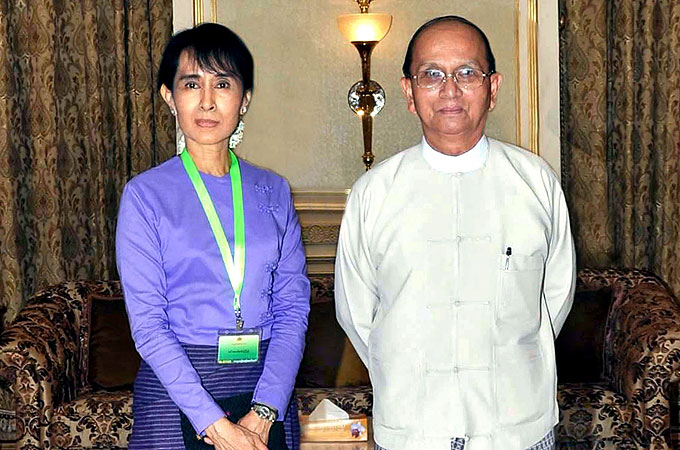Myanmar opposition leader Aung San Suu Kyi has met President Thein Sein, as she prepares to take a seat in parliament after her by-election victory.
The pair met at the president's official residence in the capital, Naypyidaw, on Wednesday, Suu Kyi's security chief Khun Tha Myint said. It was their second meeting since the former general took office last year, marking the end of nearly half a century of military rule.
"She will have lunch with the president's family after the meeting," Myint said.
Al Jazeera's Aela Callan, reporting from neighbouring Bangkok, said: "Both have made no secret of the fact that they need to work together, hence why this meeting has a formal as well as a private side to it."
The 66-year-old Nobel laureate, who spent 15 of the past 22 years locked up by the military rulers, will take her seat in the lower house of parliament for the first time on April 23.
Her National League for Democracy (NLD) party managed to win 43 of the 44 seats it contested, becoming the main opposition force in a national parliament that remains dominated by the military and its political allies.
Suu Kyi has rejected suggestions that she could enter government. But she has not ruled out taking on an advisory role, particularly on the subject of the ethnic minority conflicts that have gripped parts of the country since independence.
Political reforms
In August 2011, Suu Kyi and Sein held talks as the country embarked on a surprising series of reforms, including welcoming Suu Kyi's party into the political mainstream and freeing scores of political prisoners.
Observers say Myanmar's rulers now need Suu Kyi in parliament to bolster the legitimacy of the political system and spur an easing of sanctions.
With Myanmar being increasingly accepted by the international community, David Cameron, the British prime minister, is due to visit the country on Friday to hold talks with both Sein and Suu Kyi.
His visit will be the first by a Western elected head of government since the military handed power to a nominally civilian government last year following a controversial 2010 election boycotted by the opposition.
The US announced last week it would ease some of its sanctions against Myanmar, but said measures would remain against those opposed to reform.
The International Crisis Group think-tank on Wednesday called on the West to lift remaining sanctions "without delay" to help the reform process, saying the government was unlikely to reverse course.
"Myanmar has turned away from five decades of authoritarianism and has embarked on a bold process of political, social and economic reform," the think-tank said in a report.
